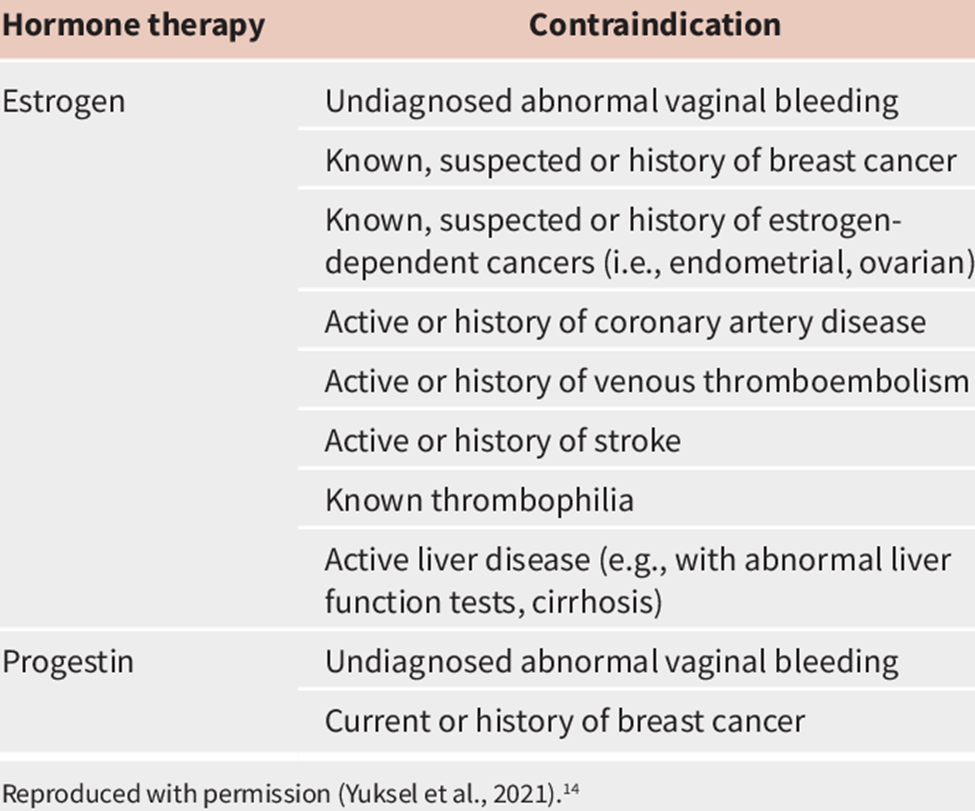A nurse is caring for a client who is experiencing menopausal symptoms and requests information about hormone replacement therapy (HRT). Which of the following items in the client's health history is a contraindication for hormone replacement therapy?
Concurrent treatment for GERD
History of breast cancer
History of dermatitis
Multiple hospitalizations for COPD
The Correct Answer is B
A. Concurrent treatment for GERD:
This is not typically a contraindication for hormone replacement therapy (HRT). GERD treatment is not directly related to the decision to use HRT.
B. History of breast cancer:
This is a contraindication for HRT. Estrogen replacement therapy has been associated with an increased risk of breast cancer. Therefore, individuals with a history of breast cancer are generally advised against using HRT.
C. History of dermatitis:
A history of dermatitis is not a contraindication for HRT. However, the decision to use HRT should be made based on a comprehensive assessment of the client's overall health and risk factors.
D. Multiple hospitalizations for COPD:
While COPD itself is not a contraindication for HRT, decisions about HRT should consider the individual's overall health status and potential risks. Factors such as smoking history and respiratory function may be considered in the assessment.

Nursing Test Bank
Naxlex Comprehensive Predictor Exams
Related Questions
Correct Answer is ["A","B","E"]
Explanation
A. Water heater temperature 54.4°C (130° F):
This water heater temperature is too high and poses a scalding risk. The recommended temperature setting for water heaters is generally below 49°C (120° F) to prevent burns.
B. Electric cords behind furniture:
Placing electric cords behind furniture can create tripping hazards. It is safer to have cords organized and placed away from areas where the client may walk.
C. Bathtub with rails:
Having a bathtub with rails is a safety feature that can assist the client in getting in and out of the bathtub safely. It is not a safety risk.
D. Raised toilet seats:
Raised toilet seats are often recommended for older adults to facilitate safe and easier use of the toilet. They are not a safety risk when used appropriately.
E. Throw rugs:
Throw rugs can be a tripping hazard, especially for older adults who may have mobility issues. They should be secured or removed to prevent falls.
Correct Answer is D
Explanation
A. Inject the medication deep into the thigh muscle.
This statement is incorrect for subcutaneous heparin administration. Heparin is typically administered subcutaneously in the fatty tissue just under the skin, not into the muscle. Intramuscular injection is not appropriate for heparin.
B. Easy bruising indicates the medication is effective.
This statement is inaccurate. Easy bruising is not an indicator of the effectiveness of heparin. In fact, excessive bruising can be a side effect of anticoagulant therapy, indicating a potential issue with bleeding or clotting.
C. Expect stools to become black and tarry.
This statement is more relevant to medications like iron supplements or upper gastrointestinal bleeding. It is not a common side effect of subcutaneous heparin.
D. Use a soft bristle toothbrush.
This statement is correct. It is important for individuals on anticoagulant therapy, such as heparin, to use a soft bristle toothbrush to minimize the risk of bleeding and gum irritation. Hard bristle toothbrushes can cause gum bleeding, especially in individuals with a tendency for bleeding due to anticoagulant use.
Whether you are a student looking to ace your exams or a practicing nurse seeking to enhance your expertise , our nursing education contents will empower you with the confidence and competence to make a difference in the lives of patients and become a respected leader in the healthcare field.
Visit Naxlex, invest in your future and unlock endless possibilities with our unparalleled nursing education contents today
Report Wrong Answer on the Current Question
Do you disagree with the answer? If yes, what is your expected answer? Explain.
Kindly be descriptive with the issue you are facing.
